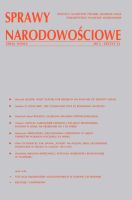Aleksander Lednicki i los jego środowiska, polonii w Rosji, na przełomie XIX i XX wieku jako zwierciadło przemian polskiego pola władzy
Aleksander Lednicki and the fate of his milieu of the Polish community in Russia at the turn of the 20th cent
Author(s): Tomasz ZaryckiSubject(s): History
Published by: Instytut Slawistyki Polskiej Akademii Nauk
Keywords: Polish intelligentsia; Polish landowners; Polish bourgeoisie; Polish-Russian relations at the turn of the 20th century
Summary/Abstract: The paper deals with the phenomenon of waning memory of the Polish economic elite in the late Russian Empire. It is related to the disappearance of the memory of the liberal political movement of the Polish political scene before the First World War. Mechanisms of these processes of forgetting are related to the theory of Pierre Bourdieu, in particular it is argued that the liberal Polish elite of the Russian Empire could be defined as economic-capital-based elite. Its rivals, both socialists led by Piłsudski and National-Democrats led by Dmowski, classical intelligentsia figures, could be seen as leaders of the cultural capital-based elites. As it is argued, the intelligentsia was in many ways a benefactor of the Bolshevik Revolution, which deprived the Polish economic elite of most of their capitals and led to its political marginalization. In effect the intelligentsia was able to impose its values and social hierarchies on the modern Polish national identity, which ever since is defined in terms largely unrelated to the economic logic. These mechanisms privilege memory of the intellectual figures and freedom-fighters in the mainstream canons of Polish history. A closer look at the forgotten economic and political Polish elite of the late Russian Empire allows to point out to several arbitrary elements in the dominant readings of the Polish and Russian history in contemporary Poland. They are illustrated in the paper on the example of the biography of Aleksander Lednicki, a prominent politician and lawyer, leader of the Polish community in Moscow until 1918.
Journal: Sprawy Narodowościowe
- Issue Year: 2013
- Issue No: 42
- Page Range: 67-82
- Page Count: 16
- Language: Polish

